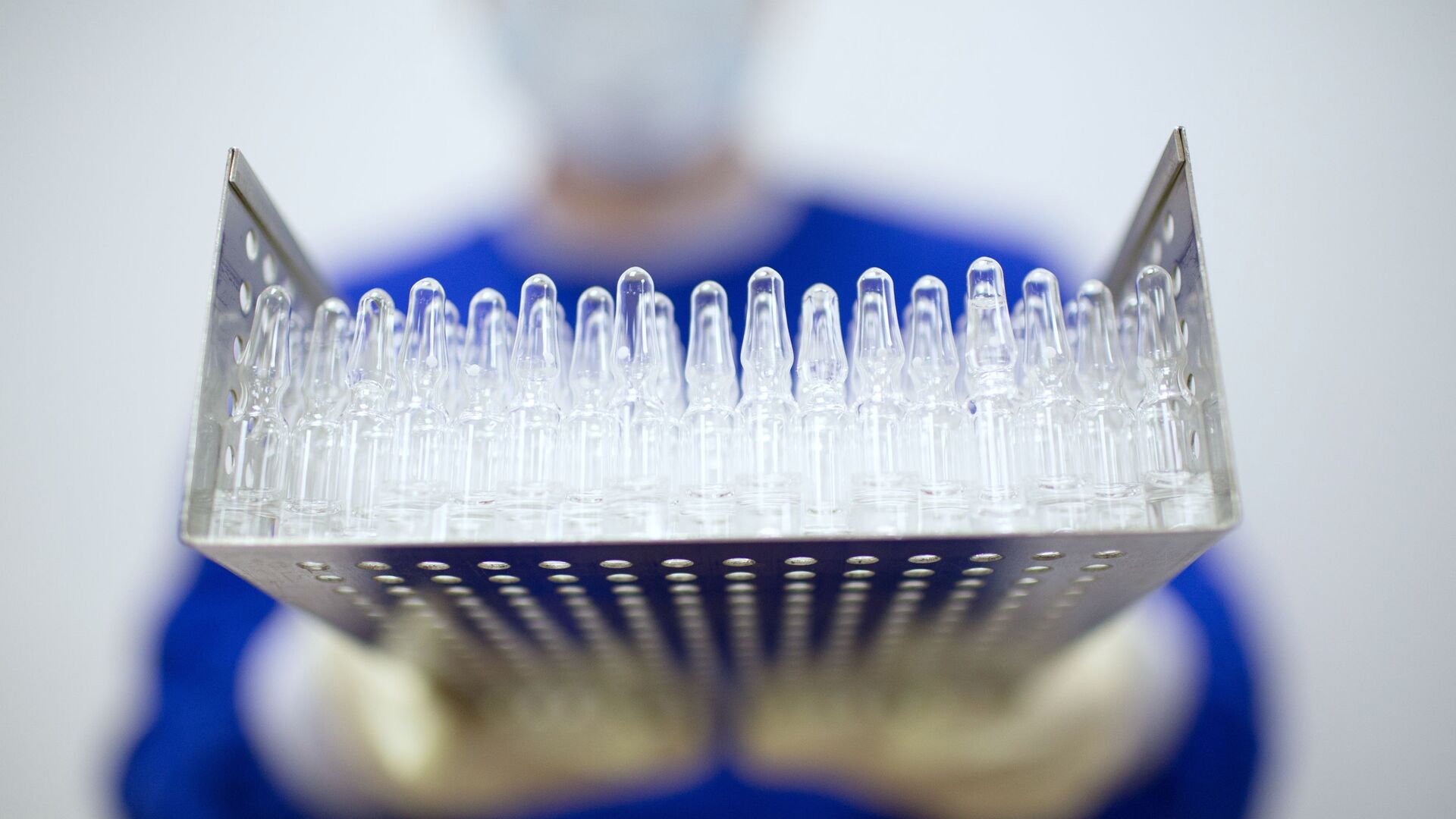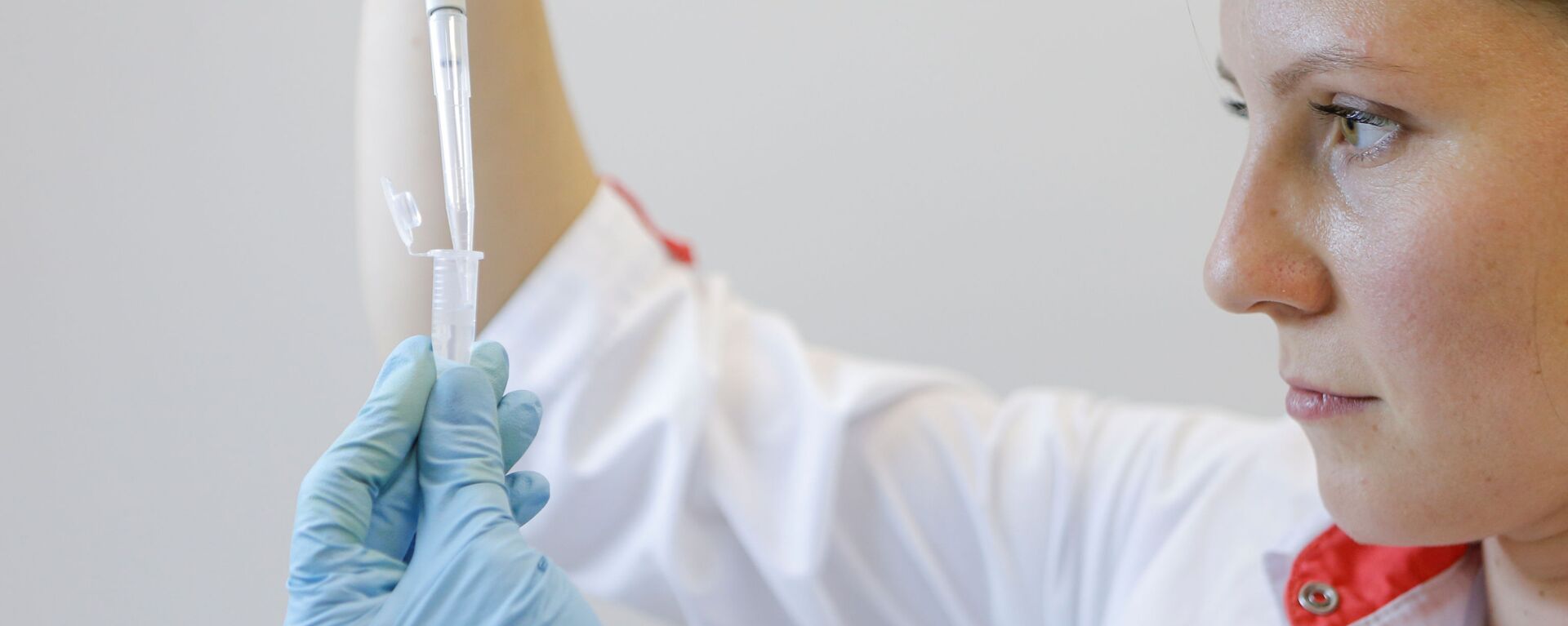https://sputnikglobe.com/20220318/russian-health-ministry-registers-fmba-developed-covid-19-vaccine-1093996463.html
Russian Health Ministry Registers FMBA-Developed COVID-19 Vaccine
Russian Health Ministry Registers FMBA-Developed COVID-19 Vaccine
Sputnik International
While other vaccines prompt an immune response against the coronavirus’ S-protein, the new compound was said to develop antibodies against the N-protein. They... 18.03.2022, Sputnik International
2022-03-18T22:31+0000
2022-03-18T22:31+0000
2022-03-18T22:31+0000
russia
vaccines
covid-19
russian health ministry
https://cdn1.img.sputnikglobe.com/img/07e4/08/1a/1080284166_0:86:3073:1814_1920x0_80_0_0_82f46cd60bfe4e2ecc9732e99334752f.jpg
The Russian Health Ministry on Friday registered Convasel, a COVID-19 vaccine developed by the St. Petersburg Research Institute of Vaccines and Sera of the Federal Biomedical Agency (FMBA), according to the official registry of medicines.The request for certification was filed on January 24 after the agency concluded the phase I and II clinical trials, which started in June last year. The trials were conducted on 200 volunteers, aged from 18 to 60 years.Unlike the five other vaccines, Sputnik V, Sputnik Light, EpiVacCorona, EpiVacCorona-N and KoviVac, authorized earlier by the Health Ministry, Convasel elicits other virus-neutralizing antibodies against SARS-Cov-2.The virus consists of 4 structural proteins: S-protein (spike), N-protein (or nucleocapsid protein), M-membrane protein and E-shell protein. Previously developed vaccines prompt an immune response against the S-protein, which is located on the surface of the coronavirus and resembles spikes or a crown.“First-generation vaccines, whose action is mainly aimed at generating virus-neutralizing antibodies against S-protein epitopes, have played a huge role in containing the coronavirus infection epidemic,” FMBA head Veronika Skvortsova said earlier.According to Skvortsova, researchers found it necessary to look for alternative options and create vaccines that induce activity among the different branches of immunity. The N-protein is the most immunogenic, which means it causes a strong immune cell response, both at the cellular and humoral (in the blood) levels, in the earliest stages of the coronavirus disease.Thus, Convasel is based on the recombinant SARS-Cov-2 nucleocapsid protein (N). It has been presented as a new-generation vaccine aimed at developing T-cell immunity – a specific immune reaction that produces a phenotype of central memory T-cells, and which develops an intracellular virus-neutralizing response.
https://sputnikglobe.com/20220318/russias-gamaleya-centre-applies-for-registration-of-nasal-vaccine-against-covid-19-1093984317.html
Sputnik International
feedback@sputniknews.com
+74956456601
MIA „Rossiya Segodnya“
2022
News
en_EN
Sputnik International
feedback@sputniknews.com
+74956456601
MIA „Rossiya Segodnya“
Sputnik International
feedback@sputniknews.com
+74956456601
MIA „Rossiya Segodnya“
vaccines, covid-19, russian health ministry
vaccines, covid-19, russian health ministry
Russian Health Ministry Registers FMBA-Developed COVID-19 Vaccine
While other vaccines prompt an immune response against the coronavirus’ S-protein, the new compound was said to develop antibodies against the N-protein. They usually appear in the natural immune response and provide better protection. The N-protein has less mutagen than the S-protein, which may increase the effectiveness of the new vaccine.
The Russian Health Ministry on Friday registered Convasel, a COVID-19 vaccine developed by the St. Petersburg Research Institute of Vaccines and Sera of the Federal Biomedical Agency (FMBA), according to the official registry of medicines.
"Convasel Recombinant subunit vaccine for the prevention of coronavirus infection caused by the SARS-CoV-2 virus. Registration date: 03/18/2022," the registry said.
The request for certification was filed on January 24 after the agency concluded the phase I and II clinical trials, which started in June last year. The trials were conducted on 200 volunteers, aged from 18 to 60 years.
Unlike the five other vaccines, Sputnik V, Sputnik Light, EpiVacCorona, EpiVacCorona-N and KoviVac, authorized earlier by the Health Ministry, Convasel elicits other virus-neutralizing antibodies against SARS-Cov-2.
The virus consists of 4 structural proteins: S-protein (spike), N-protein (or nucleocapsid protein), M-membrane protein and E-shell protein. Previously developed vaccines prompt an immune response against the S-protein, which is located on the surface of the coronavirus and resembles spikes or a crown.
“First-generation vaccines, whose action is mainly aimed at generating virus-neutralizing antibodies against S-protein epitopes, have played a huge role in containing the coronavirus infection epidemic,”
FMBA head Veronika Skvortsova said earlier.
“At the same time, the accumulation of data on the active mutation of the S-protein, including in the receptor domain, has raised concern among the international expert community in terms of the subsequent effectiveness and even safety of these vaccines,” she noted.
According to Skvortsova, researchers found it necessary to look for alternative options and create vaccines that induce activity among the different branches of immunity. The N-protein is the most immunogenic, which means it causes a strong immune cell response, both at the cellular and humoral (in the blood) levels, in the earliest stages of the coronavirus disease.
Thus, Convasel is based on the recombinant SARS-Cov-2 nucleocapsid protein (N). It has been presented as a new-generation vaccine aimed at developing T-cell immunity – a specific immune reaction that produces a phenotype of central memory T-cells, and which develops an intracellular virus-neutralizing response.



